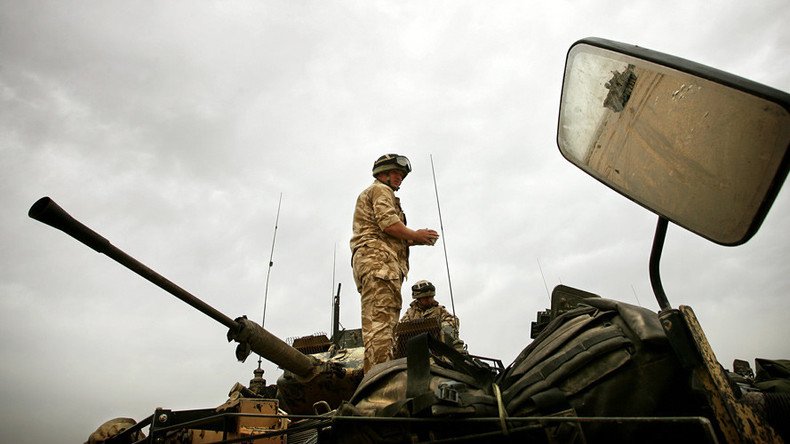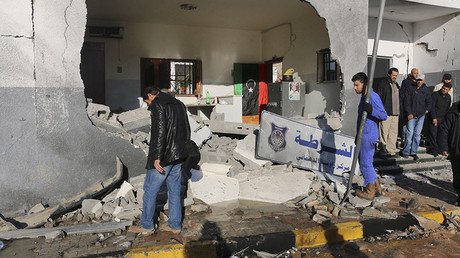UK cannot ‘rule out’ deploying ground troops in Libya, Hammond says

British ground troops, supported by the Air Force and Navy, may go to Libya to take action against Islamic State in the future, UK Foreign Secretary Philip Hammond said, just days after telling MPs that no such plans were in the works.
Foreign Secretary Philip Hammond made his remarks in a Telegraph interview on Sunday. Islamic State (IS, formerly ISIS/ISIL) are seeking to turn Libya into a “bolthole” for launching attacks on mainland Europe or Western ships at sea, Hammond argued.
“It wouldn’t make sense to rule anything out because you never know how things are going to evolve,” Hammond told The Telegraph. “But if there were ever any question of a British combat role in any form – ground, sea or air – that would go to the House of Commons.”
The Foreign Secretary warned that there is a possibility that IS could send terrorists across the Mediterranean to Italy in order to mount attacks, adding that British cruise liners and commercial ships have already been warned to avoid the coast off the Libyan city of Sirte.
“The southern Mediterranean coast is a vital security interest. Clearly, internationally-focused terrorists, established on the Mediterranean coast, are a threat to all the countries of Europe, including the UK.”
Asked whether Islamists could cross the Mediterranean in boats to reach Europe, he said: “It is only 100 miles from Libya to Lampedusa [the southernmost island of Italy]. I think it is a threat. If Daesh [Arabic acronym for the Islamic State] became established in Libya and sought to use that established base to infiltrate terrorists into Europe, that would be a threat to all of us.”
Hammond said that it is “extremely unlikely” that the new Tripoli-based Libyan government under Prime Minister Fayez Sarraj will request Western forces to provide combat support or even train its troops in foreseeable future, but, again, he did not rule it out.
“Our first duty – all of us – is to protect our citizens,” he stressed.
Britain would also be ready to consider sending combat jets to conduct air strikes in support of an assault on the IS in Sirte.
“If naval or air support was requested for such an action, we would obviously look at it,” the British FM said.
In #Tripoli to discuss UK support w/ PM Serraj & welcome important progress made by his Govt in #Libya
— Philip Hammond (@PHammondMP) April 18, 2016
Announced £10 million package to support #Libyan Govt on visit to #Tripoli - vital for security and stability https://t.co/6ErW0ikKfq
— Philip Hammond (@PHammondMP) April 18, 2016
Hammond made a surprise visit to Libya last week to hold talks with Prime Minister al-Sarraj, who has taken the helm of the country’s fledgling new government.
After his trip, he told the House of Commons: “We do not anticipate any requests from the GNA [Libya’s Government of National Accord] for ground combat forces to take on Daesh or any other armed groups and we have no plans to deploy troops in such a role.”
He also reported that Prime Minister Sarraj, to whom he has pledged £10 million (about US$14.4 million) in financial support, had unambiguously told him that the Libyan people had no “appetite for foreign combat troops” on their soil.
Nevertheless, the Cabinet is said to be considering deploying up to 1,000 British troops in the region to train local Libyan forces. Earlier on Saturday, Defense Secretary Michael Fallon announced that the HMS Enterprise, a Royal Navy survey ship that is already off the Libyan coast, will begin gathering intelligence on terrorist arms smuggling operations.
UK in talks to deploy up to 1,000 troops to Libya as Hammond arrives in Tripoli https://t.co/BP6mxmrZqJpic.twitter.com/ZVTqglLyJ2
— RT UK (@RTUKnews) April 18, 2016
Since a Western-led intervention led to Muammar Gaddafi’s ouster and death in 2011, with the UK playing a leading role, Libya has gradually descended into chaos. It has been ruled by a handful of paramilitary groups and Islamist factions since then, which has allowed Islamic State to capture a considerable amount of territory in and around Sirte.
President Barack Obama previously told The Atlantic magazine that the Libyan intervention has turned the country into a “mess,” privately describing the situation there as a “sh*t show.”
In hopes of putting an end to the instability, Sarraj’s new UN-backed Government of National Accord (GNA) was formed to unite members of the two competing governments that had been trying to rule Libya from opposite ends of the country. The Islamist-leaning administration in Tripoli stepped down to make way, but a rival parliament still remains in the city of Tobruk in the country’s east.













